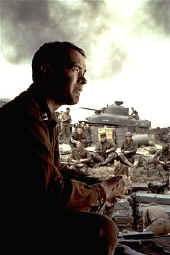Bible | Movies | Books | Hot Topics | Holidays | Humor | Gallery | Sanctuary | Sermons | Prayer | Quizzes | Communities | FAQ
|
|
With Saving Private Ryan, Spielberg rescues not only the summer season, he reinvents the "war movie," turning it into a parable, which like the biblical originals, has the power to shatter conventional wisdom and send us off in search of deeper truths. By now you're probably familiar with the outlines of Rodat's plot which revolves around the attempt to rescue Private Ryan. His three brothers have been killed in combat; the rescue effort, led by Captain John Miller (Tom Hanks) is part public relations gambit, and part an act of misguided sentiment on the part of General George C. Marshall. Hanks and his fellow rescuers are well aware of the potential folly of their mission: putting the lives of their entire unit at risk to rescue one man. And through their eyes we see, not only their personal dilemma, but the madness of warfare itself. Clearly the opening scene depicting the landing at Omaha beach contains some of best film footage ever-made, of any subject. The closing battle scene also ranks right up there. In between there are some smaller vignettes that will earn Kaminski an academy award nomination for sure, even if Saving Private Ryan does not sweep the field in 1999 as did Titanic in 1998. What makes me compare this film to a New Testament parable? It tells a deceptively simple story, subject to a variety of interpretations, all of them touching upon the fundamential question of life's meaning and purpose. As the parables of Jesus took the circumstances and local conditions of his time and place as a backdrop, so does Saving Private Ryan, though the true screen against which this film is projected is not World War II, but rather the post-cold war world of the closing moments of this century of warfare. Depite the flag waving and the sentiments projected by the World War II veteran and his family whose memories constitute a visual frame in which this movie is set, this film has an attitude, and it is distinctly post-modern. Missing here is the clear line of demarkation between good and evil, between heroism and cowardice, between right and wrong. In Saving Private Ryan, it is the American troops who are guilty of war crimes, gunning down the surrendering Germans, who, with one exception, are a faceless enemy. The most effective killer among Captain Miller's men is sharpshooter Jackson (Barry Pepper), a Bible believing southerner who quotes from the Psalms as he picks off the enemy one-by-one. The young linguist, Corporal Upham (Jeremy Davies) intervenes to save one German captive, only to see the object of his mercy return to kill at least two of his comrades. What rules upon these killing fields, and in this European countryside, and the smoldering cities, is not a God of mercy, but the chaos, unrestrained violence, random suffering and death that is an inevitable part of warfare. This is a world where Chance is the King of Kings. And Spielberg is his prophet. If there is any hope of redemption -- Spielberg holds out at least a hope that there is, even in the flawed mission that Captain Miller and his men finally do embrace -- it is a redemption that flows out of the very heart of Chaos. Which may be the best hope that those of us who inhabit a thoroughly deconstructed world will ever know. Five flames.
| |||

Charles Henderson
You are invited to discuss any of the topics suggested
on this page at
The
CrossCurrents Forum
Your
comments are published here instantly
(To see the current list of topics your browser must allow Active Content)
| CrossCurrents |
| Recent Discussions |
Other related and recommended sites you might want to visit:
God and Science (Hypertext
Edition, 2005)
Chapters
on Charles Darwin, Paul Tillich and de Chardin now available).
Please
take a moment to let us know you were here!
Use the mail drop
to indicate your interest in being included in our free newsletter.
If
you want to talk with someone in person, please feel free to call:
The
Rev. Charles P. Henderson is a Presbyterian minister
Publisher of CrossCurrents
Author of God and Science
Telephone: 212-864-5436

 With
the help of cinematographer Janusz Kaminski, writer Robert Rodat, composer John
Williams, and well chosen actors from Tom Hanks to Matt Damon, Steven Spielberg
has come up with a winner. It was Spielberg, we now remember, who helped invent
the genre: summer blockbuster. Given some of the stuff that Hollywood has dished
out during this season in recent years, one might have thought this was one of
Spielberg's more regretable contributions to the industry. I've often wondered
why the movie producers seem to assume that this is a season for dumbing down.
Surely not all of us have gone brain dead from too much fun in the sun.
With
the help of cinematographer Janusz Kaminski, writer Robert Rodat, composer John
Williams, and well chosen actors from Tom Hanks to Matt Damon, Steven Spielberg
has come up with a winner. It was Spielberg, we now remember, who helped invent
the genre: summer blockbuster. Given some of the stuff that Hollywood has dished
out during this season in recent years, one might have thought this was one of
Spielberg's more regretable contributions to the industry. I've often wondered
why the movie producers seem to assume that this is a season for dumbing down.
Surely not all of us have gone brain dead from too much fun in the sun.
